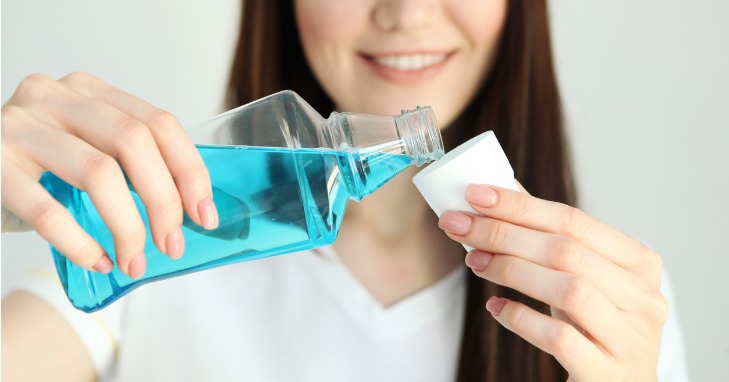
Mouthwash may not be part of your daily dental routine. However, it’s worth finding out a little more about mouthwash and deciding if it can benefit you.
#1 Does Mouthwash Do Anything?
Some people are a bit sceptical about mouthwash. Is it clever marketing or does it actually have some benefits? We can confirm there are benefits to using mouthwash, and here they are:
Freshen Your Breath
Mouthwash can give your mouth a quick freshen-up. However, people with bad breath (halitosis) should check in with their dentist as mouthwash will only mask the problem temporarily.
Improves Oral Health
The bristles of your toothbrush may not get into every nook and cranny of your mouth every time you brush. If you have braces, there are even more surfaces in your mouth for bacteria to thrive. To avoid the accumulation of bacteria, you should spend a little longer brushing and be more diligent in your routine. Using mouthwash can help to kill the bacteria your toothbrush can't reach.
Wash Away Food Particles
For people worried about bits of food staying between their teeth after lunch, mouthwash can be your friend. When brushing the teeth is not an option, a swish of mouthwash can rinse away some of the food and freshen the breath.
#2 What to Know About Mouthwash
Mouthwash doesn’t replace brushing and flossing. You will always need to brush and floss morning and night whether you use mouthwash or not. Mouthwash alone can’t remove bacteria and plaque from the surface of teeth like a toothbrush and between teeth like floss.
Not Suitable for Young Children
Mouthwash containing alcohol shouldn’t be used by children under six years old. Parents should be confident that their child won’t swallow the mouthwash when introducing it to their oral hygiene routine. The fluoride and alcohol content (usually 18-26%) of mouthwash means it shouldn’t be swallowed under any circumstance.
No Need to Rinse
Like your toothpaste, the fluoride in mouthwash means it’s ideal for leaving on your teeth to provide lasting protection. Rinsing with water after using the product will remove the goodness from your teeth.
Mouthwash Can Be Diluted
If the mouthwash is personally too strong, the option is to dilute it with water at a 1:1 ratio. The mouthwash will still be effective.
#3 Types of Mouthwash
Most mouthwash and toothpaste sold over the counter in Australia are classified as cosmetics (rather than therapeutic goods). They can only claim to improve oral hygiene and prevent tooth decay but can’t claim to prevent gum disease or periodontal conditions.
The supermarket shelves are full of different coloured mouthwashes, and it can be confusing to choose one. Some of the properties that are usually promoted include fluoride, antiseptic, teeth whitening, breath freshening, plaque inhibiting, and prevention.
We recommend two basic types of mouthwashes when indicated. One is a potent antibacterial mouthwash containing chlorhexidine (Savacol) that is used following surgical procedures in the mouth. This is recommended for individuals who may be struggling to control dental plaque and its effects on the mouth. Unfortunately, prolonged use of this mouthwash may stain your teeth and reduce your sense of taste, but it is effective in controlling bacterially induced inflammation. Low-dose fluoride mouthwashes (Colgate Neutrafluor 220) are great for reducing the incidence of enamel decay or white spot lesions in patients with braces however the stronger concentrations work well with individuals with high decay rates.
#4 How to Use Mouthwash
The directions to use mouthwash are relatively simple, although it can take a little time to master the swish.
-
Pour around 2 tablespoons of mouthwash into a clean cup.
-
Pour the mouthwash from the cup into your mouth (don't swallow).
-
Swish and gargle the mouthwash around your mouth for 30 seconds (it gets easier to swish for this long with practice).
-
Spit the mouthwash into the sink and don't rinse.
#5 Why You Should Use Mouthwash
If you have braces or Invisalign, it’s worth finishing your twice-daily dental routine with a swish of mouthwash. The added protection of mouthwash is worth the extra 30 seconds it adds to your routine. If you’re wearing braces, you want the peace of mind that you’ve removed as much bacteria as possible from your mouth after brushing, flossing, and swishing. Invisalign patients should be even more mindful of removing the bacteria, as their teeth won't benefit from saliva keeping bacteria at bay. So when you put your Invisalign retainers back in, you want to be sure that your teeth and gum are as clean as possible.
Studies have shown that bacteria in dental plaque and saliva significantly reduce after being exposed to mouthwash such as Listerine, for 30 seconds.
For more information on oral hygiene prior to, during, and post orthodontic treatment, call your nearest clinic, contact us online or book an appointment.